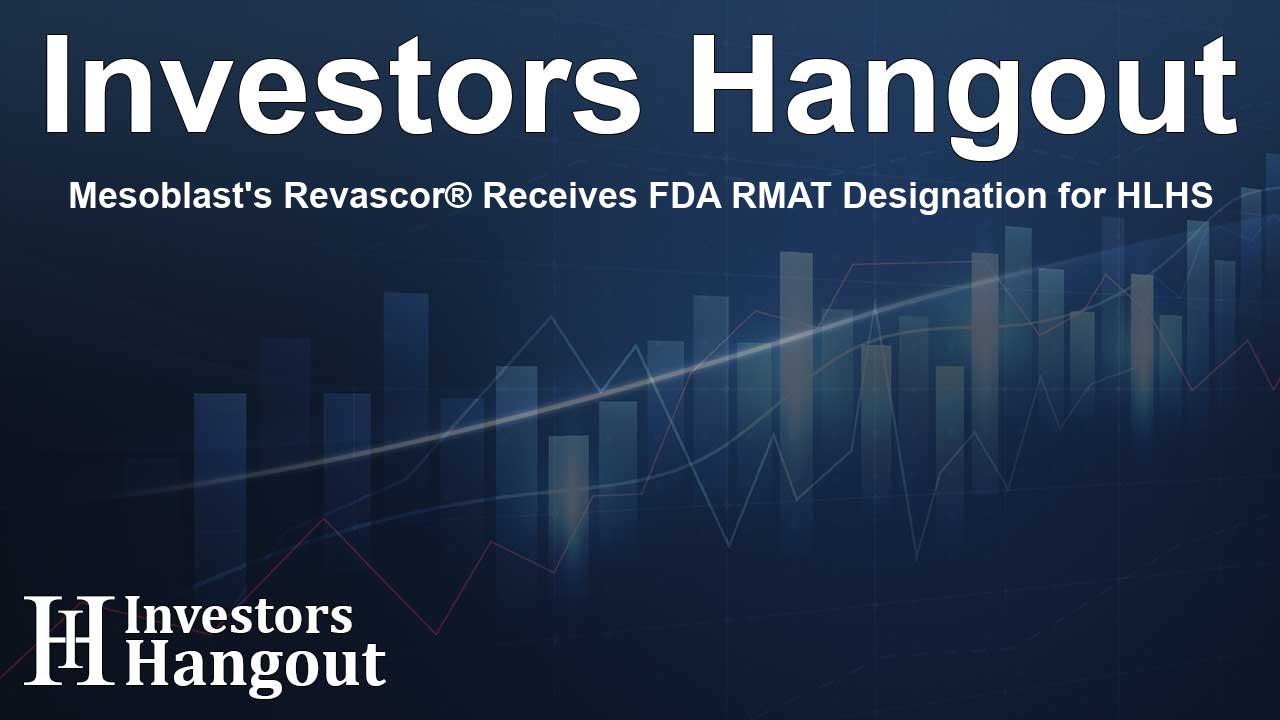Mesoblast's Revascor® Receives FDA RMAT Designation for HLHS

Mesoblast Limited Achieves FDA RMAT Designation
In a significant breakthrough for pediatric heart health, Mesoblast Limited has announced that the U.S. Food and Drug Administration (FDA) has granted their stromal cell therapy, Revascor (rexlemestrocel-L), the Regenerative Medicine Advanced Therapy (RMAT) designation. This recognition follows the publication of results from a randomized controlled trial investigating Revascor's efficacy in children suffering from hypoplastic left heart syndrome (HLHS), a serious congenital heart condition.
Revascor's Potential Impact
Chief Executive of Mesoblast, Silviu Itescu, expressed gratitude for the FDA's endorsement. He emphasized that this designation indicates the potential of Revascor to significantly improve outcomes for children who are critically ill due to HLHS. Itescu noted that under the RMAT designation, Mesoblast intends to collaborate closely with the FDA to outline a clear route towards full regulatory approval for this innovative treatment.
Rare Pediatric Disease Designation
Earlier this year, the FDA also awarded Revascor both Rare Pediatric Disease Designation (RPD) and Orphan Drug Designation (ODD). These marks indicate that HLHS primarily affects individuals from birth to 18 years and recognizes Revascor's potential to address a serious and rare medical condition. If a Biologics License Application (BLA) is approved, Mesoblast may receive a Priority Review Voucher (PRV), providing greater incentives for future applications.
The Significance of RMAT Designation
The RMAT designation facilitates the development of regenerative therapies targeted at serious or life-threatening conditions when preliminary clinical evidence indicates their efficacy. This designation streamlines review processes, akin to Breakthrough and Fast Track designations, including the potential for priority review upon filing a BLA.
Clinical Trials and Results
Recent findings from a double-blind, randomized, placebo-controlled trial involving 19 children with HLHS have shown promising results. The trial demonstrated that a single administration of Revascor at the time of surgery led to statistically significant increases in left ventricular (LV) volumes over a 12-month period, measured using three-dimensional echocardiography. Such improvements are vital for the successful surgical management of HLHS, enabling better heart function and circulatory support for patients.
Understanding Hypoplastic Left Heart Syndrome
Hypoplastic Left Heart Syndrome is a severe condition characterized by incomplete development of the left side of the heart. Without immediate surgical intervention, the condition can lead to high mortality rates in newborns. Most patients struggle with left ventricular growth, which is crucial for maintaining adequate blood circulation.
Mechanisms of Action of Revascor
Revascor is derived from allogeneic, immunoselected, and cultured mesenchymal precursor cells and has shown multiple beneficial mechanisms. These mechanisms include promoting neovascularization, limiting fibrosis, and modulating the immune response—all of which can address significant complications in patients with HLHS.
Mesoblast's Commitment to Innovation
Mesoblast remains at the forefront of developing allogeneic cellular therapies for severe inflammatory conditions. The company's proprietary technology allows them to produce large-scale, standardized therapies that can be delivered globally, aiming to provide availability and accessibility for patients who need them most.
Continued Research and Development
Mesoblast is actively pursuing various product candidates targeting distinct indications through the use of its allogeneic stromal cell technology. One of these is remestemcel-L, focusing on inflammatory diseases, while rexlemestrocel-L is highlighted for its potential in advanced chronic heart failure and other conditions. These breakthrough therapies represent hope for many patients affected by serious health issues worldwide.
Frequently Asked Questions
What is the significance of the RMAT designation for Revascor?
The RMAT designation accelerates the development and approval process for Revascor, indicating its potential to address unmet medical needs for pediatric patients with HLHS.
How did Revascor perform in clinical trials?
In clinical trials, Revascor demonstrated significant improvements in left ventricular volumes compared to placebo, highlighting its potential benefits in treating HLHS.
What are the future steps for Mesoblast regarding Revascor?
Mesoblast plans to engage with the FDA to explore the approval pathways for Revascor, leveraging its RMAT designation.
Why is HLHS a critical condition to address?
HLHS poses a high risk to newborns and can result in severe complications and mortality without immediate intervention, making effective treatments like Revascor vital.
What other conditions does Mesoblast target with its therapies?
Aside from HLHS, Mesoblast is working on therapies for chronic heart failure and inflammatory conditions in both adults and children, enhancing its commitment to improving patient outcomes.
About The Author
Contact Thomas Cooper privately here. Or send an email with ATTN: Thomas Cooper as the subject to contact@investorshangout.com.
About Investors Hangout
Investors Hangout is a leading online stock forum for financial discussion and learning, offering a wide range of free tools and resources. It draws in traders of all levels, who exchange market knowledge, investigate trading tactics, and keep an eye on industry developments in real time. Featuring financial articles, stock message boards, quotes, charts, company profiles, and live news updates. Through cooperative learning and a wealth of informational resources, it helps users from novices creating their first portfolios to experts honing their techniques. Join Investors Hangout today: https://investorshangout.com/
The content of this article is based on factual, publicly available information and does not represent legal, financial, or investment advice. Investors Hangout does not offer financial advice, and the author is not a licensed financial advisor. Consult a qualified advisor before making any financial or investment decisions based on this article. This article should not be considered advice to purchase, sell, or hold any securities or other investments. If any of the material provided here is inaccurate, please contact us for corrections.
